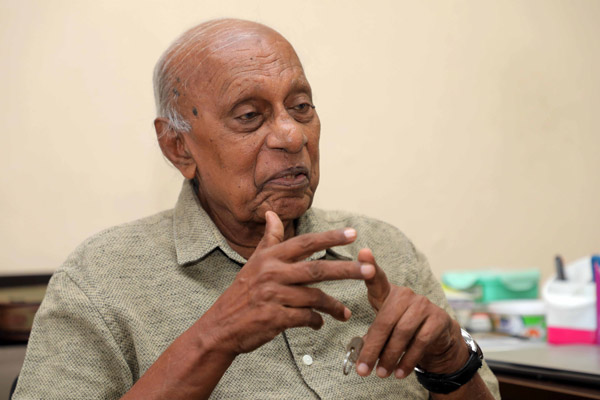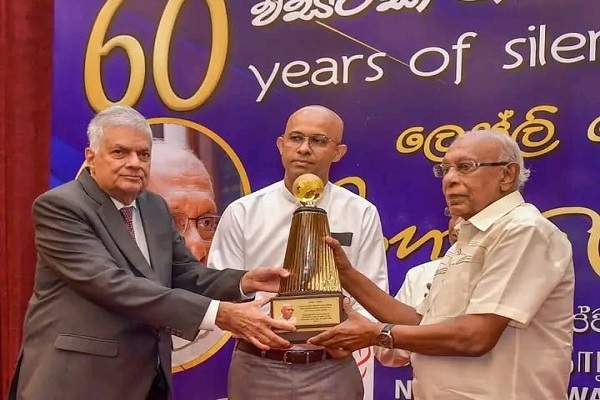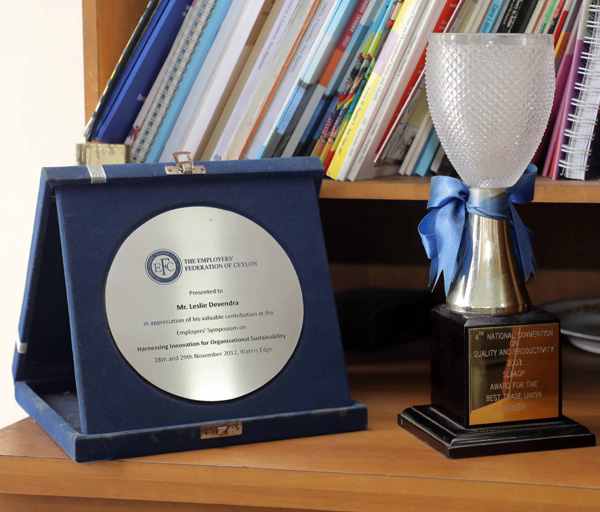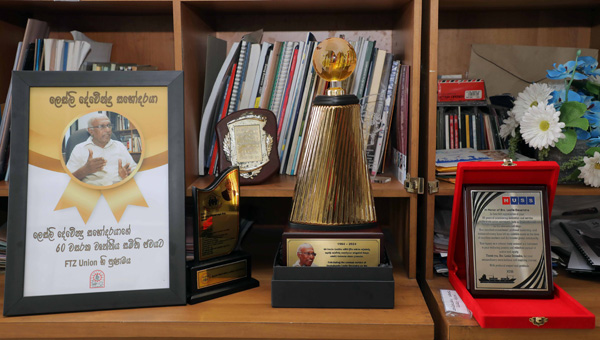By Ishu Bandara
Leslie Devendra, a prominent and experienced trade union leader in Sri Lanka, recently celebrated 60 years of trade unionism, reflecting on a journey marked by perseverance, integrity and commitment to workers' rights. Despite continuing to be sidelined from parliamentary representation, Devendra's commitment to his cause remains unwavering.
Devendra was removed from the National List of Members of Parliament six times, with his name first included and then removed in 1989 under Sirimavo Bandaranaike's government. This pattern continued under the governments of Mahinda Rajapaksa, Chandrika Kumaratunga, Maithripala Sirisena.
"They put my name on the National list and cut it six times. If I go to the parliament, I will speak out about the wrongdoings of them. They are scared of that,"That is the only reason that they don’t pick me". Devendra revealed to TimesOnline.
Early Life and Career
Born and raised in Colombo, Devendra attended Royal College, one of the most prestigious schools in Sri Lanka. After completing his Advanced Level exams, he joined the State Engineering Corporation as his first job. His involvement in the trade union movement was influenced by his roommate, Ananda Panagoda, the then general secretary of the Ceylon Mercantile Industrial and Workers Union (CMU). Reluctant at first but ,Devendra soon found immense satisfaction in helping workers resolve their issues, which lit up his lifelong passion for union activities.
Union Activities and Challenges
For a decade, Devendra worked under Mr Balathampo at CMU, despite disagreements over political philosophies.
"I didn’t agree with his political philosophy, and he was a bit of a dictator, but he was a very honest man committed to his cause, and I learned a lot from him," Devendra recalled.
After ten years of service in CMU,in 1974, he joined the Independent Workers Union, affiliated with the Sri Lanka Freedom Party (SLFP), under Sirimavo Bandaranaike's leadership. he found significant corruption and political interference, and expressed his outspoken stance against such practices.
"It was a very poor condition here at that time, we had about only 5,000 member and from the senior branch official I started taking interesting the main union activities.
The activities taken by the union leader Devendra does not like by the other leaders of the union and they plotted him to put in to the jail in 1986.
"Mr J R Jayawardana who was the president used to come to see his dentist just next to our office. These guys had come in the night and planted some small bombs and gave a tip to the CID, saying that me and other few members were plotting kill the president." "I was working in the office as usual ,suddenly a jeep came in and they said they want to search the office, our office was the wooden structure at that time and we never close that wooden door, then they came with the bucket full of bombs which was packed in to the bottle lids.Then we were arrested and remanded nearly one and half months" , described the situation that he faced by Mr Devendra.
Upon his release, he lost his job but was appointed assistant secretary of the union at 'Nidahas Sevaka Sangamaya'.
Starting with an average salary of 250 rupees and dependent on a bicycle for transportation, Devendra gradually built the union into a powerful organization with assets worth billions and a membership of 70,000 across various sectors, including plantations. The 'Nidhahas Sevaka Sangamaya' (Independent Workers Association) became the largest union in the country.
Advocacy and Vision
Devendra highlighted privatization as a current major issue in Sri Lanka, criticizing the government's tendency to privatize even profitable enterprises under IMF pressure.
"There is a conservative idea in England it says that " The government of business is not the Business of Government " business should be done by the business man, emphasized by Mr Devendra.
He expressed concern that nearly all major enterprises were planned to be for privatized , which he saw as unprecedented move in Sri Lankan history.
"When the country began experiencing a major crisis at the start of the 21st century, we realized that the behavior of trade unions was not appropriate. They only think about themselves and not about the country," said Mr Devendra.
"We must think about our country first. Union members can fight for their rights, but they should also do their jobs," he urged.
Devendra created a vision for the union as a 'Successful Enterprise Satisfied Workforce' and he publicized their vision through unions around the country.
According to him, their discussions are at the table, not on the street. After doing some research on the case, they went to the employers, argued about it and signed a collective agreement with the employers to allow industrial peace.
"Nidahas Sevaka Sangamaya( Independent Workers Association) has signed 65 collective agreements, the highest number by any trade union in Sri Lanka. We have agreements with SriLankan Airlines, Petroleum Cooperative, Airport Authority and State Pharmaceutical Cooperative & with many Private companies," union leader Devendra said.
As the general secretary of the union, Devendra continues to lead negotiations, participate in training programs nationwide, and handle inquiries from 400 branches.
His emotional plea for patriotism and responsibility sums up his life's work, "We are the ones making Sri Lanka a bad place to live. We must cultivate patriotism in our souls." emphasized by Devendra.
Current Activities and Future Challenges
Despite his achievements, Devendra expressed concern over the decline in youth participation in trade unions. He said this was due to the difficulty in finding a suitable successor and the lack of interest among the younger generations. To counter this, their union has initiated educational seminars and other activities to improve decision making among its members.
He regretted that the biggest challenge these days is that the authorities are misleading the members. He also said that ministers should tell the common people about the dark reality in the country.
"In the end, people blame the politicians, but we are the ones who put them in power, we are the ones who send the robbers to the parliament and allow them to rob." said Mr Devendra.
Devendra's influence extends beyond national borders. Under his leadership, the Nidahas Sevaka Sangamya established international relationships with global unions, aligning their objectives and strategies. These international collaborations have enriched the union's approach, incorporating best practices from around the world and enhancing their advocacy for workers' rights.
As he approaches the twilight of his career, Devendra reflects on the changes he has witnessed in the labor movement. The challenges have evolved, but his commitment remains steadfast.
"In all our activities, we should think about our country first. We must instill patriotism and responsibility in our souls," he asserted.
Legacy and Reflections
Devendra's endeavor is to grow the association not only in size but also in influence. He tried to modernize the association's operations and introduced financial management practices that significantly increased its assets. His leadership has also seen the union play an active role in social issues such as advocating for better healthcare, education and workers' living standards.
He often reflects on Sri Lanka's social and economic landscape, noting how much has changed since he first joined the trade union movement.
"The country was very different when I started. We've seen a lot of growth, but also a lot of challenges. Our role as a union is to ensure that growth benefits everyone, not just a select few." said by the general secretary of the union Devendra.
Leslie Devendra's life's work underscores the importance of integrity, resilience and a deep commitment to the welfare of workers and the nation. As he continues to champion the cause of workers, his story remains a powerful reminder of what can be achieved through unwavering commitment and principled leadership.




Leave Comments